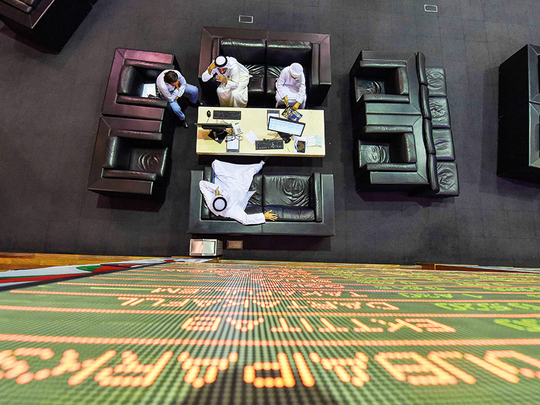
Dubai: Now local investors will be able to get a domestic exposure to companies through Exchange Traded Funds (ETF), a concept of investing which are already popular globally.
Earlier in the month, the Dubai Financial Market launched a platform for ETF’s for investors, which has exposure in a basket of stocks, which participants believe is a better way to access markets rather than taking positions in a single stock.
“Our offering is geared as an extra investment tool to help aid current and new investors to better invest in the UAE,” Seif Fikry, chief Executive Officer at Afkar Capital Limited, who launched their first ETF on the DFM platform said.
The fund with the symbol — UAETF — invests in the liquid stocks on all the three local exchanges which are the DFM, the Abu Dhabi Securities Exchange (ADX), and Nasdaq Dubai. The fund currently invests across 32 securities, of which more than half are listed on the ADX, 38 per cent on the DFM, and the remaining 8 per cent on Nasdaq Dubai. In terms of sectors 39 per cent of the stocks belong to financials, and 28 per cent belongs to real estate, and the remaining are telecom firms.
And for Afkar Capital, liquidity in the 32 securities was the moot point, and the illiquid stocks were filtered out.
“We were fully aware of the liquidity issue when constructing UAETF with S&P where we built the index focused on liquidity. The index tracks the investable universe with a liquidity filter. Hence illiquid securities are removed from our index,” Fikry said.
And the feedback from investors has been positive. The fund currently has Dh2 million of assets under management, and wants to expand by getting more local and international investors.
“We are hopeful that we have a steeper learning curve in our parts of the world and see a pick up in demand both from the investors and issuers now that the regulations are in place,” said Fikry.
And the DFM thinks that more ETFs will make a beeline later.
Global trend
“I expect more ETFs to come to the market (locally). There are on and off talks. This is the beginning and once people see this succeeds, more people will come to the market,” Hassan Al Serkal, chief operating officer and head of operational division, at DFM told Gulf News on March 5.
Finally the UAE wants cash in on the global trend of robust investments in ETFs.
“ETF’s are popular due to their transparent structures. Clients love transparency to the extent they are calling this democratisation of investment,” said Fikry, adding “currently the ETF industry is perceived as a much better “regulatory wrapper” than less transparent fund regimes.”
The nine-year average for monthly flows into ETFs globally is $22 billion (Dh80.7 billion) till 2016, while in January worldwide ETFs recorded inflows of $63 billion. This was the highest monthly figure since September 2015, when ETFs saw global inflows of $73 billion. Ernst and Young expects the global ETF market to $6 trillion from the current $3.7 trillion. “We want to be a part or a small chunk of that,” said Al Serkal.
“We are not anticipating that it will boom now, and it will take its time, and once people realise the value of it, they will come and trade,” said Al Serkal.
Target
The new ETF is targeting all sorts of investors i.e. the retail, family offices and institutions.
“The family offices that would prefer to allocate part of its portfolio to Beta exposure (index replication) and let its investment advisers focus on beating the index with less securities to worry about, through the more complex investor that will use the index as a hedging or a cash management tool,” Fikry said.
“This has been the largest collaborative work of my 20 year career and to see the enthusiasm by all the above in this project makes me an even bigger believer that we will have a much more advanced and developed Financial services industry in the next five years that will help aid our economies in its future growth path,” he added.



